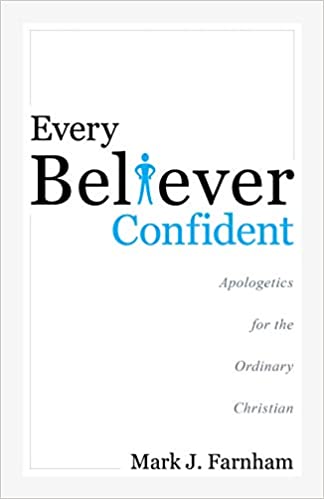An Author Interview from Books At a Glance
If “apologetics” sounds to you like something that is so high-falutin that it is “for professionals only” and not the work of every Christian, then you haven’t read this book. I’m Fred Zaspel here at Books At a Glance, and I’m talking today to Dr. Mark Farnham about his very helpful new book, Every Believer Confident: Apologetics for the Ordinary Christian.
Mark, welcome, and congratulations on your new book!
Farnham:
Thanks, Fred. I am glad to be back on the show and to talk about the book.
Zaspel:
Let’s start with the basics: What is apologetics?
Farnham:
Apologetics is essentially defending and sharing the Christian faith with the ability to answer questions and to overcome objections. It has been defined a number of ways, but that’s essentially what it is.
Zaspel:
Okay, big question: it is often assumed that apologetics is a task for trained professionals only. Why should “ordinary Christians” concern themselves with it, and how is it related to evangelism?
Farnham:
A great question. There certainly is high-level apologetics. I tend to divide apologetics into two categories, academic and practical. The academic certainly is necessary, so when you give academic think of debates between philosophers or scientists or with Christian apologists, and that is necessary, and also writing and publishing at a high level. But there’s also a need for practical apologetics, which is not in the life of every Christian who has an attempt to share the gospel in the encounter objections and questions. The truth is, most Christians, most people in the world, will never develop proficiency with areas like philosophy and science. There needs to be a practical level of apologetics that allows the average Christian to defend his faith and share his faith effectively by answering those questions that come up. And so I would say that it’s necessary for every Christian because 1 Peter 3:15 and 16 makes it clear that we are all called to set apart Christ as Lord and always be prepared to make a defense, or give an answer, and that is the Greek word apologia so that every Christian ought to be prepared and able to do that.
Zaspel:
Okay then, how is apologetics related to evangelism? Are they one and the same? Is one a means to the other end? Or is it a necessary distinction?
Farnham:
It is an important distinction, and I think because evangelism we are sharing clearly the good news of the gospel and expressing clearly how Christ is the answer to how the cross and the resurrection are the keys to God’s salvation of mankind to be received by grace through faith. But these days, I don’t know that in many places, at least in the West, you can share that good news of the gospel without objections or questions coming up, so I would say that they are distinct but inseparable. So, whenever someone asked the question or raises an objection, you have to have apologetics to be able to answer those questions or overcome those objections, so that you can continue on presenting the good news of Christ clearly.
Zaspel:
Okay, so when you’re talking to your friend about Christ, he raises an objection you answer the objection, you are in apologetics whether you like it or not.
Farnham:
Yeah, absolutely and unfortunately some people have never prepared themselves to answer questions, and so when they encounter that their monologue is over and they may simply say well you just need to accept it by faith or something like that. But I don’t think that is the way the New Testament portrays our evangelism.
Zaspel:
Now you’ve been active recently doing seminars for churches and different things. Haven’t you to equip people for just this kind of thing, isn’t that right yet?
Farnham:
Yeah, for about the last 12 to 15 years I have been going to churches.
Zaspel:
Tell us a little bit about that or any resources we can go to online to find out about you.
Farnham:
Sure, I have a ministry entitled or called Apologetics for the Church. You can find that at apologeticsforthechurch.org, and it is basically a resource to show that in the course of one weekend, if the church will have me in, I can help the average Christian, the ordinary Christian, who doesn’t know philosophy or science or doesn’t even know apologetics that well, I can help them move from a desire to share and defend their faith confidently to an ability to do that than anyone that they encounter. That way they have a basic game plan of how to engage them with spiritual questions or with the gospel.
Zaspel:
Give us the web address again
Farnham:
Apologeticsforthechurch.org
Zaspel:
What should we know about unbelievers as we talk to them and try to answer their concerns and objections?
Farnham:
Great question, and I address this in my book, and I learned this at Westminster Theological Seminary, where I did my Doctor of Apologetics. For me, it was the most eye-opening thing to learn. It basically comes from Romans 1. The truth is Romans 1 says that every unbeliever knows the truth of God, knows some things about God, knows that they are guilty before God, because God has implanted that knowledge in them, and five times in Romans 1, it is repeated that they know these things. It is clear to them, because God is shown it to them, but they suppress the truth in unrighteousness, and the truth for me that was so revolutionary was that every unbeliever I meet knows the truth of God, knows they are guilty before God, that he is holy, and that they must stand before him. But they suppress that truth through a number of different ways—anything from the false religion, through addictions, to distractions, to any number of different ways to push down that rising knowledge, so that they don’t have to face up to it that. That means I can engage any unbeliever, regardless of who they are by acknowledging that in my approach to them.
Zaspel:
What should be our goal in apologetic encounters? Where should we aim to take the conversation? And how do we get there?
Farnham:
That is great. The ultimate aim of the conversation get them to Jesus—to get them to the claims of Christ, that he is the son of God, that he is the Messiah, that he died and rose again, and that salvation is only found in him. So, as I’m talking to an unbeliever, that is my ultimate end goal. Now I don’t always get there with people because they may have too many objections to get to that first time, but my goal is to find out what they do believe in. This is the key to the presuppositional approach to apologetics, the covenantal apologetics approach, is to take the time to listen and ask questions to figure out where they are spiritually and begin to address some of those areas of unbelief. Some of those areas of suppression of the truth. And I seek to dismantle them, as many of them allow me to, and at the same time, I’m doing that to begin the present Christ. I study and contrast their worldview. In contrast, I present their worldview, their belief system, as inherently contradictory or unlivable or irrational, and then at the same time present the good news of the gospel of the glory of Christ as the rational, as the only true path, to salvation.
Zaspel:
In chapter 8 you talk about “Strategies for Effective Apologetic Encounters.” Can you give us a couple of samples here?
Farnham:
Sure, in the book, I lay out a basic approach to conversations with unbelievers, but I have also mentioned a few specific things that people tend to run up against—anything from logical fallacies anything, and sometimes people appeal to authority. They say things like, “Well don’t you know Richard Dawkins of the Royal Academy of Science, and how must those people don’t believe in Christianity or reject the belief in God?” So, learning to understand and recognize logical fallacies is a big one. Also, listening for mistaken beliefs. I had a great conversation on the plane one time with a guy who mistakenly thought that Jesus had sinned one time. He was pretty lighthearted about it, he wasn’t dogmatic, but when I explained that Jesus had not sinned and showed them that the one instance he thought where Christ had done something that was wrong, he was quite surprised, and conceded that point right away and that opened up a magnificent opportunity to go further presenting the gospel.
I also talk about how often people make assertions without presenting arguments and learning to discern when someone simply is making a statement but has no argument to present behind that statement. I help people realize that something we need to spend a lot of time seeking to answer because unless the unbeliever can present an argument, it is simply an opinion.
Zaspel:
Give us a brief overview of your book so our listeners can know what to expect.
Farnham:
Sure, I start off by explaining what apologetics is, showing the warrant for it in Scripture, how God defends his glory and cause us to defend his glory and present Christ. I talk about the power of apologetics and talk about the role the Holy Spirit in prayer and how apologetics and evangelism relate to one another. And then I have a whole chapter as I mentioned on understanding unbelievers which I think is one of the keys, and then spent some time talking about how to ask questions and to listen and to begin to present refutations and arguments against what an unbeliever holds to before you present Christ so that you are targeting your presentation of the gospel to where they are spiritually. And then the rest of the book is given two different strategies for doing that effectively, understanding how to present the gospel clearly, and then the book concludes by touching on key doctrinal areas: the doctrine of Scripture, the doctrine of God, and the doctrine of man and sin. This way we make sure that we are defending and presenting the gospel in an orthodox Christian way. We don’t fall into a trap of defending views that we don’t even really believe.
Zaspel:
I think it will be helpful to point out too that your book is not just theory, as you just described it. It’s very much a hands-on approach to be helpful for as you call the ordinary Christian to do evangelism in apologetics more effectively.
Farnham:
Yes, and I share a lot of my personal experiences doing that and a lot of my failures because I’m certainly by no means a super evangelist.
Zaspel:
We’re talking to Dr. Mark Farnham, author of the new book, Every Believer Confident: Apologetics for the Ordinary Christian, an extremely practical guide for effective witness for “ordinary” Christians. Get a box or two of these books and distribute them generously in your churches!
Mark, thanks for your good work and for talking to us today.
Farnham:
Thank you, Fred.

